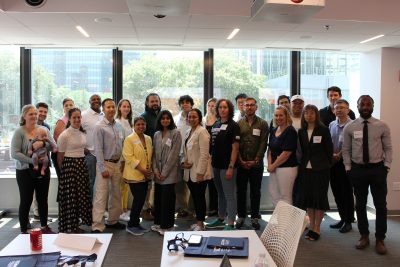
The Connecticut Center for Entrepreneurship and Innovation (CCEI) is proud to celebrate the achievements of the June/July cohort of the Accelerate UConn Propelus program. Over the course of this four-week initiative, as part of UConn’s National Science Foundation (NSF) Innovation Corps site, participants gained critical skills and resources to explore the market potential of their early-stage ideas.
During the program, teams took part in an in-person kickoff event, attended a series of three webinars, and conducted at least 20 customer discovery interviews. After meeting these requirements, each team was awarded a $1,500 stipend from the NSF to help advance their validation efforts.
We applaud these teams for their commitment and perseverance, and we’re excited to watch their ventures continue to grow.
June/July Accelerate UConn Propelus
OncoBarrier
Yasir Suhail, Gunter Wagner, Kshitiz
A prognostic test to predict the chances of cancer metastasis and progression — utilizing a custom-built AI model that exploits the patients sequencing information and an in-house nanotechnology assay. This information can be used to guide treatment and surveillance plans, saving healthcare costs to the insurer and a better quality of life to the patient.
We-Sensing
Baikun Li, Xingyu Wang, Yu Lei
All-in-one NH4+ sensors for real-time in situ water quality monitoring. The distinct features include low cost, high accuracy, long lifespan, and easy-to-deploy, which beat the commercial NH4+ sensors. Our target customers will start with controlled environmental agriculture (CEA), which badly need miniature sensors for nitrogen monitoring.
Black Spark Inc.
Emily MacNaught, Gunnar Stratton
A destructive PFAS treatment technology that is more effective, efficient, scalable, and safe than any existing destructive PFAS treatment techniques. PFAS remediation is a rapidly expanding field with major economic and public health implications. While the entire market will ultimately be valued in the tens of billions, our immediate addressable market (companies that are storing millions of gallons of highly concentrated PFAS brine) is in the hundreds of millions.
Actual
Stefan Louis
On-demand geospatial data collection using autonomous drones, capable of scanning anything, anywhere, anytime. The technology targets businesses and services that rely on precise physical information quickly. Development begins in simulation through what’s known as a sim to real pipeline, enabling seamless transition from virtual testing to real world deployment.
Peer Habits Tracker
Tae Park, Vanessa Balistreri, Francisco Luna, Julie Park
A web app designed to revolutionize goal achievement through accountability. Unlike traditional habit trackers focusing on solo progress, our platform fosters peer support, making habit-building more engaging. Many apps lack accountability, and one-on-one coaching can be costly, especially for students. Instead, users connect with peers on our platform to stay accountable and motivated.
CereNova
Rhea Doshi, Ashkan Novin, Roshni Patel
By analyzing how people walk while performing basic mental operations, NeuroStride can detect diseases like Parkinson's and Alzheimer's up to 15 years before symptoms appear. Long before memory loss or tremors start, our low-cost system uses a pressure-sensitive walkway, standard video tracking, and tablet-based exercises to identify subtle movement changes that indicate early brain changes.
Sinergia
Daniel Giraldo, Juan Pablo Mateus
An encapsulation process for cannabis terpenes which enables to use them in food matrices. Cannabis terpenes are the aromas and flavors and they are very valuable although it is very hard and expensive to encapsulate them for use. We created a very scalable and environmental friendly system which keeps all the organoleptical compounds while preserving the biofunctionality at low cost.
EnJoy
Jamie Smith, Jeyaraj Vadiveloo, Rupal Parekh
A mobile/web application that leverages multi-system partnerships and community-based social work practice to improve social engagement and wellbeing for older adults across various health domains (e.g., mental, physical, social, financial). The gamified technology rewards older adults for participating in targeted activities with redeemable points used to reduce common barriers and increase access to services (e.g., transportation, event fees).
Rayzor
Samuel Medina, Zane Yacoub, Jackson Bonneau
An automated ice resurfacing system that uses multiple small machines to quickly and efficiently resurface ice without a driver. It reduces labor costs, cuts downtime, and improves ice quality — offered as a subscription.
LitheVision
Qian Yang, Yushuo Niu, Haley Reed
Precise and real-time visual inspection in environments where labeled data is scarce, images have low quality, and imaging conditions vary. It is built on a data-efficient computer vision framework that tackles a common challenge across different fields: extracting meaningful features from small, noisy datasets without depending on extensive annotations or rigid imaging setups.
Sumsaara
Pritish Aklujkar, Pragati Rout
Providing a two-way solution for the ever-increasing electronic and electrical waste that will help in reduction of E-waste and proper disposal — mitigating the environment and biological impact of E-waste.
—
This cohort benefited from the expertise of a talented group of instructors: Jenn Burka, Leland Holcomb, and Claire Zick. Their guidance was fundamental in helping participants navigate the customer discovery process and strengthen their skillsets.
In 2024, UConn became a member of The NSF Innovation Corps (I-Corps™) Northeast Hub — part of a national NSF-funded network designed to accelerate the real-world impact of federally supported research. The Hub drives innovation across sectors like healthcare, technology, and environmental sustainability, while also expanding access to entrepreneurial opportunities for researchers from diverse backgrounds.
To learn more about the Hub, visit icorpsnortheasthub.org, or explore our program details and upcoming cohorts at ccei.uconn.edu/accelerate-uconn.
For specific questions about Accelerate UConn, please reach out to Alycia Chrosniak at alycia.chrosniak@uconn.edu.